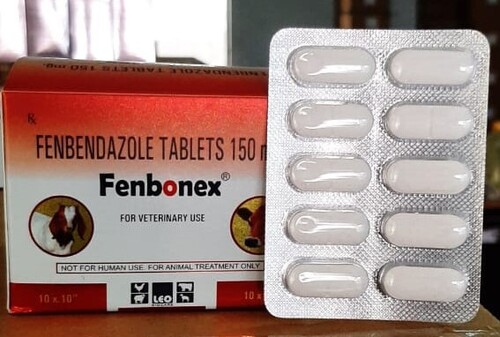fenbendazole capsules: FAQs Answered
Recognizing the Conveniences and Uses of Fenbendazole in Vet Medicine
Fenbendazole has actually established itself as an essential anthelmintic in veterinary medication. Its capability to target different parasitical infections makes it a beneficial tool for veterinarians. The medicine's system interferes with vital cellular procedures in bloodsuckers, resulting in effective therapy end results. Its safety account differs between types, demanding cautious factor to consider in its usage (fenbendazole capsules). Comprehending these characteristics can clarify fenbendazole's broader ramifications in vet care and ongoing research right into its prospective beyond standard applications
System of Activity of Fenbendazole

Typical Parasitic Infections Dealt With With Fenbendazole
A selection of parasitic infections are properly treated with fenbendazole, making it a flexible choice in veterinary medicine. This anthelmintic agent is particularly efficient versus nematodes, including roundworms and hookworms, which typically affect pet dogs and cats. It is likewise made use of for the treatment of cestodes, such as tapeworms, providing a broad spectrum of action versus both sorts of digestive tract bloodsuckers. Additionally, fenbendazole is advantageous in managing infections created by protozoa, particularly Giardia, which can bring about stomach distress in animals. Its efficiency encompasses treating particular lungworms in dogs and felines, addressing respiratory health and wellness issues linked to these bloodsuckers. In general, fenbendazole's capability to target several parasitical species makes it a valuable tool in vet technique, making sure the health and well-being of family pets influenced by these usual infections.
Safety and security and Efficiency in Various Pet Species
The security and efficiency of fenbendazole vary among different pet varieties, emphasizing the significance of species-specific factors to consider in vet medication. In dogs, fenbendazole is normally well-tolerated and efficient against a range of gastrointestinal bloodsuckers, consisting of roundworms and hookworms. For felines, nevertheless, its use is less typical and may call for mindful application as a result of potential adverse reactions.
In animals, such as cattle and sheep, fenbendazole demonstrates performance against various endoparasites, contributing to improved health and performance. The pharmacokinetics and possible side effects can differ noticeably between varieties, necessitating careful analysis by vets.
Horses also respond positively to fenbendazole, particularly for dealing with strongyles and ascarids, though dose and management routes must be tailored to their unique physiology. Consequently, understanding these distinctions is important for optimizing therapy outcomes and making sure animal well-being across varied varieties.
Administration and Dosage Guidelines
Correct management and dosage guidelines are vital for taking full advantage of the healing effects of fenbendazole while lessening possible negative effects. The dose usually varies relying on the types being treated, the particular condition, and the solution of fenbendazole used. fenbendazole 444. For dogs and cats, a common dosage is 50 mg/kg body weight, carried out daily for three successive days, yet veterinarians may readjust this based upon individual health and wellness assessments
It is essential to administer fenbendazole with food to enhance absorption and lessen intestinal trouble. The medication is offered in numerous kinds, including granules and paste, permitting for adaptable management alternatives. Keeping track of the pet's action during and after treatment is recommended to confirm efficacy and security. Furthermore, veterinary support is crucial to determine the appropriate period of therapy based upon the try here type of parasitical infection being dealt with, ensuring ideal outcomes for the animal's health and wellness.
Future Viewpoints and Research on Fenbendazole
Research on fenbendazole remains to advance, concentrating on its potential applications beyond typical antiparasitic usages. Current researches have explored its efficiency in treating numerous types of cancer cells, particularly in vet oncology. Initial data recommend that fenbendazole may hinder the development of growth cells and enhance the effects of various other chemotherapeutic agents.
Researchers are examining its role in taking care of intestinal problems in animals, highlighting its anti-inflammatory residential or commercial properties. The flexibility of fenbendazole for various types questions regarding its safety and security accounts and excellent dosing programs in diverse populations.
As interest expands, there is a requirement for extensive professional tests to develop evidence-based standards for these novel applications. Future research study might also explore the systems behind fenbendazole's results, potentially leading the way for ingenious restorative strategies in vet medication. The ongoing expedition of fenbendazole can considerably boost treatment options for various vet problems.

Often Asked Questions
Is Fenbendazole Safe for Pregnant Animals?
The security of fenbendazole for expecting animals remains unsure. While some studies suggest minimal danger, vets generally suggest caution and frequently recommend against its usage while pregnant unless the advantages clearly exceed potential dangers.
Can Fenbendazole Be Made Use Of in Livestock?
Fenbendazole is commonly utilized in livestock to deal with different parasitical infections. fenbendazole. Its efficacy against intestinal worms makes it an important anthelmintic, adding to improved wellness and productivity in pets increased for food and fiber
What Are the Adverse Effects of Fenbendazole?

The side results of fenbendazole may include stomach disruptions, lethargy, and allergies. In uncommon situations, Full Article much more severe responses could occur, requiring mindful surveillance and consultation with a vet during treatment.
Exactly How Does Fenbendazole Compare to Other Dewormers?
Fenbendazole uses broad-spectrum effectiveness against numerous parasites, commonly contrasting favorably to various other dewormers. Its unique device targets various life stages, making it efficient, while generally presenting a positive security account compared to choices available on a knockout post the marketplace.
Can Fenbendazole Be Utilized for Dealing With Cancer in Family Pets?
The capacity of fenbendazole in dealing with cancer cells in pets has amassed interest. Initial research studies recommend it may hinder cancer cell growth, but even more research study is needed to confirm its effectiveness and safety and security in veterinary oncology.